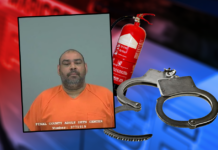Maricopa city council Tuesday night voted 6-1 to approve an ordinance prohibiting recreational marijuana dispensaries in the city unless they are part of a dual-license facility permitted to sell medical cannabis.
Passed with an emergency provision, the ordinance goes into effect immediately. Typically, a new ordinance would take effect 30 days after approval.
POLL: Should Maricopa have a recreational marijuana dispensary?
Councilmember Vincent Manfredi cast the lone dissenting vote, but not because he wants marijuana dispensaries in town. His opposition had more to do with his capitalist view outweighing his personal preferences, he said.
“I don’t want dispensaries in the city of Maricopa, clear and simple,” he said. “But I don’t feel we should be sitting in the way of dispensaries coming to the city of Maricopa. It’s a free market. I’m a free-market type of guy.”
The emergency provision was needed to get the city ordinance on the books prior to the state enacting its own policies, which will begin next month. Recreational sales are set to begin June 1. Cities without their own ordinance in place before the state law takes effect must follow that law. Most councilmembers said Tuesday night they voted yes on the city ordinance to give the city more time to study the issue, gather information and get feedback from constituents.
City manager Rick Horst said the city benefits from the emergency ordinance.
“if we don’t take action, the state will determine the rules without public input from the local citizens and there’s no coming back from that,” Horst said. “So, what this is doing tonight is preserving the right for the local community to self-determine its own needs. The thrust of what we do tonight is we’ll need to amend the ordinance in any direction, and you can have multiple public meetings to do that going forward to address the will of the public and make sure they have plenty of time.”
If the ordinance had not passed, the public would have no input into the matter and the state rules would be adopted automatically, Horst said. Tuesday’s decision preserves the city’s right to hold future discussions and public meetings on the issue. And while it does set forth some restrictive standards, the city can amend its own ordinance at any time.
Police Chief Jim Hughes noted several ways the city may be able to control the viability of marijuana dispensaries. Among those actions: using zoning regulations to limit the use of land to specific areas; limiting or prohibiting the number of marijuana establishments or testing facilities; regulating the time, place and manner in which they operate; restricting signage; and prohibiting or restricting delivery.
The ordinance requires a recreational marijuana dispensary in the city to be a dual-license facility, selling both medical and recreational pot at the same location. The onerous restriction serves to prevent a medical license holder in another city or county from using their recreational license to open a stand-alone facility in Maricopa.
City attorney Denis Fitzgibbons said the restriction is the norm in Arizona.
“What you’re doing tonight is consistent with what a lot of cities are doing, in requiring any dispensary to be a dual-license,” he said.
Vice Mayor Nancy Smith said she did not want to have to live with regulations handed down by the state.
“I have had to live with state regulations that I had no control over,” Smith said. “They regulated my city in a way that I may have disagreed with in many instances and I don’t want them to take over local control of this. I think it’s really important to look at this seriously tonight, and for the public to understand what it affords us in time in reviewing all the aspects.”
Proposition 207 legalized recreational marijuana with some restrictions. It allows for the use and possession of a small amount of marijuana by residents over the age of 21 and permits regulated possession of a limited number of marijuana plants. It limits legal use to a person’s private residence and prohibits public usage. It also levies a 16% excise tax on the sale of marijuana.
About 57% of Pinal County voters approved the proposition. It carried all precincts in the city of Maricopa.
Dispensaries will be able to legally sell recreational marijuana after licenses are granted by the Arizona Department of Health Services, which is expected in March.
Vincent Manfredi is minority owner of InMaricopa.






![In mayoral race, it’s the Nancy Smith show Maricopa Chamber of Commerce Executive Director Kelly Anderson grills incumbent Mayor Nancy Smith in election's first campaign event April 30, 2024, at Southern Dunes Golf Club. [Elias Weiss]](https://www.inmaricopa.com/wp-content/uploads/2024/04/CRM_1009-218x150.jpg)
![Merging lanes incite more 347 anger A merging lane sign sits on the side of State Route 347 northbound lanes during evening traffic on April 30, 2024. [Monica D. Spencer]](https://www.inmaricopa.com/wp-content/uploads/2024/04/spencer-043024-adot-merging-lanes-347-web-218x150.jpg)



![City gave new manager big low-interest home loan City Manager Ben Bitter speaks during a Chamber of Commerce event at Global Water Resources on April 11, 2024. Bitter discussed the current state of economic development in Maricopa, as well as hinting at lowering property tax rates again. [Monica D. Spencer]](https://www.inmaricopa.com/wp-content/uploads/2024/04/spencer-041124-ben-bitter-chamber-property-taxes-web-218x150.jpg)






The people voted in sales of marijuana a long time ago, it shouldn’t even banned from our city today.
What nobody is saying officially in this article is that the city sees the benefits in the tax income generated from dispensaries.
Money talks…. even if there are backward thinkers that are blind to see the harm alcohol and big pharma consumption does to people. If you are opposed to marijuana and don’t have any problems with alcohol and prescribed pain killers or anti-depressants, you are a hypocrite.